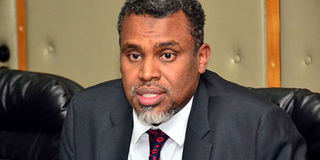Noordin Haji wants state officers facing charges to step aside

Director of Public Prosecutions Noordin Haji during the national policing conference at the Kenya School of Government in Nairobi. PHOTO | FILE | NATION MEDIA GROUP
What you need to know:
- Mr Haji said public officials continuing to hold office on full pay and benefits after being charged in court undermined the cause of justice.
- Mr Obado is out on bail over the murder of university student Sharon Otieno and her unborn baby.
- The DPP described the terms of Mr Obado’s bail as “wanting”.
The Director of Public Prosecutions (DPP) Noordin Haji wants Parliament to amend the Anti-Corruption and Economic Crimes Act to bar public officers charged with corruption from holding offices and earning salaries.
Citing the cases of Deputy Chief Justice (DCJ) Philomena Mwilu and Migori Governor Okoth Obado, Mr Haji said public officials continuing to hold office on full pay and benefits after being charged in court undermined the cause of justice.
The courts stopped Ms Mwilu from taking plea over charges of abuse of office and forgery related to the fallen Imperial Bank until a constitutional reference she has made is determined.
OUT ON BAIL
Mr Obado is out on bail over the murder of university student Sharon Otieno and her unborn baby. Like DCJ Mwilu, he continues to hold public office and draw his salary from the State.
National Lands Commission chairman Muhammad Swazuri was also reinstated by the courts despite being arraigned in court over the Sh5 billion Ruaraka land scandal.
“I am frustrated that once I charge certain individuals, I can’t get them to face the law. Some remain in their offices to flex their muscles, to intimidate witnesses and interfere with the investigations,” Mr Haji said on Tuesday during Citizen TV’s “Newsnight” show.
He said the Judiciary is the stumbling block in the war on corruption and urged concerted efforts from the three arms of government to eliminate corruption.
STEP ASIDE
He cited the failure by Ms Mwilu and constitutional office holders to step aside after their arrests and subsequent arraignment, and the courts’ knack to issue conservatory orders against the prosecution of influential individuals as some of the drawbacks in getting convictions for corrupt people.
The DPP described the terms of Mr Obado’s bail as “wanting”.
He said he was unfairly accused of fighting in the Executive’s corner to intimidate the Judiciary when he arrested and prosecuted Ms Mwilu on suspicion that she abused her office.
In her court papers, the DCJ linked her arrest to President Uhuru Kenyatta’s threat to “revisit” with the Judiciary after it nullified the outcome of the August 8, 2017 General Election, where he had been declared the winner.
POOR RECORD
Mr Haji absolved President Kenyatta from blame over the slow and poor record of getting convictions in corruption cases, putting the blame squarely on the criminal justice system.
“It’s not fair to ask the executive to explain the slow rate of convictions. Anyone with issues should table it to my office or that of the CJ,” he said.
Those pointing fingers at the President over the cases, he said, were motivated by politics. “I am saying this to defend the President. The truth is that he has nothing to do with it.”




